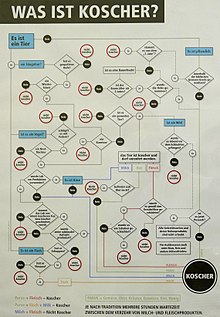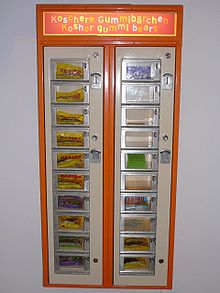Kashrut
![]()
Kosher is a redirect to this article. For other meanings, see Kosher (disambiguation).

The Jewish dietary laws (Hebrew כַּשְרוּת kashrut, in Ashkenazic pronunciation kashrus "ritual harmlessness") are Halakhah regulations for the preparation and consumption of food and drink; they are based on the dietary commandments of the Torah, the five books of Moses, and were further developed in rabbinic Judaism. The halakha received interpretations in the Talmud as well as additions of customs and traditions, which were summarized in the Shulchan Aruch.
According to these regulations, foods are divided into those that are permitted for consumption (כּשר kosher) and foods that are not permitted for consumption (טרײף treife). The way Jews deal with kashrut today varies greatly and covers a wide spectrum from strict observance by Orthodox Jews, to partial observance by Reform Jews, to complete non-observance by secular Jews who, while respecting specific Jewish values, do not practice Judaism as a religion with all its precepts, at most occasionally maintaining one tradition or another.
Generally, gentiles reduce the Jewish dietary rules to the prohibition of pork. The dietary laws, however, go far beyond this, are highly complicated, and are interpreted differently.

"What is kosher?", poster in the Zwi Perez Chajes School of the Jewish Community (IKG) in Vienna.

A vending machine for kosher gummy bears made of fish gelatin instead of pork gelatin at the Jewish Museum Berlin
History
Biblical scholars usually assume that the priestly code, including most of the books of Leviticus and Numbers, dates from after the Exile (6th or 5th century BC). Others have argued for an earlier dating of the priestly code, holding that these laws are older than those of Deuteronomy. whose origin is commonly seen as dating to the 7th century BCE. Just because a class of priests adopts or promulgates a set of laws does not mean that those who use the cultic services of the priests also observed those laws and whether in fact the people accepted and obeyed the laws of the Torah. Over the centuries, the dietary laws were continually commented upon and expanded.
Basics in the Torah
In the weekly section Zav (Biblical Hebrew צַו 'Command [Aaron]!') they are partially explained (Leviticus 6:1-8:36), which states regarding the dietary laws:
- Peace offering as a thank offering in connection with unleavened and leavened bread
- Prohibition to eat the flesh of these sacrifices later than the second day and in impurity.
- Prohibition to consume the pieces of fat. They are to be sacrificed, even in profane slaughtering.
- Prohibition of blood consumption
Likewise, in the parashah Re'eh (Biblical Hebrew רְאֵה 'Behold!', 5th Book of Deuteronomy 11:26 - 16:17), it is pointed out that regarding the dietary laws:
- No blood to be enjoyed; in slaughtering the blood shall be covered with sand
- Permitted and prohibited animals in the sense of the dietary laws
- The seventh year is the "Schmitta" year
The main difference between Deut 14 and Lev 11 is that the latter expands its provisions to deal with the effects of forbidden diets on overall purity as a result of forbidden contact, such as the possible staining of cooking and storage vessels. Thus, all food stored in vessels must be kept dry (11:32-34).
Questions and Answers
Q: What is Kosher?
A: Kosher is the name given by Jews to the laws about the kind of food they may eat.
Q: What do their holy books specify about the food?
A: Their holy books specify certain kinds of food that are all right to eat and that other kinds should not be eaten.
Q: What does the Kosher law say about meat and dairy products?
A: The Kosher laws say that products classified as meat must not be eaten in the same meal with dairy products.
Q: What are pareve foods?
A: Fish, fruit, and vegetables are considered neutral, called pareve (pronounced "PAR-veh"), and may be eaten with either meat or dairy meals.
Q: What do Jews who "keep kosher" do with their utensils?
A: Jews who "keep kosher" have separate utensils for meat and dairy foods.
Q: What do Jews do before eating the other type of food?
A: Jews wait a number of hours after eating one type of food before eating the other type.
Q: What is treif?
A: Meat that is not fit to eat is called treif (pronounced TRAYf).
Search within the encyclopedia